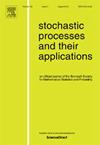Optimal control of the nonlinear stochastic Fokker–Planck equation
IF 1.2
2区 数学
Q3 STATISTICS & PROBABILITY
引用次数: 0
Abstract
We consider a control problem for the nonlinear stochastic Fokker–Planck equation. This equation describes the evolution of the distribution of nonlocally interacting particles affected by a common source of noise. The system is directed by a controller that acts on the drift term with the goal of minimising a cost functional. We establish the well-posedness of the state equation, prove the existence of optimal controls, and formulate a stochastic maximum principle (SMP) that provides necessary and sufficient optimality conditions for the control problem. The adjoint process arising in the SMP is characterised by a nonlocal (semi)linear backward SPDE for which we study existence and uniqueness. We also rigorously connect the control problem for the nonlinear stochastic Fokker–Planck equation to the control of the corresponding McKean–Vlasov SDE that describes the motion of a representative particle. Our work extends existing results for the control of the Fokker–Planck equation to nonlinear and stochastic dynamics. In particular, the sufficient SMP, which we obtain by exploiting the special structure of the Fokker–Planck equation, seems to be novel even in the linear deterministic setting. We illustrate our results with an application to a model of government interventions in financial systems, supplemented by numerical illustrations.
非线性随机Fokker-Planck方程的最优控制
考虑非线性随机Fokker-Planck方程的控制问题。这个方程描述了受共同噪声源影响的非局部相互作用粒子的分布演化。系统由控制器控制,控制器作用于漂移项,目标是最小化成本函数。我们建立了状态方程的适定性,证明了最优控制的存在性,并构造了一个随机极大值原理(SMP),为控制问题的最优性提供了充分必要条件。SMP中出现的伴随过程具有非局部(半)线性后向SPDE的特征,我们研究了其存在唯一性。我们还将非线性随机Fokker-Planck方程的控制问题严格地与描述代表性粒子运动的相应McKean-Vlasov SDE的控制联系起来。我们的工作将现有的控制福克-普朗克方程的结果扩展到非线性和随机动力学。特别是,我们利用Fokker-Planck方程的特殊结构得到的充分SMP,即使在线性确定性设置下也显得新颖。我们通过应用政府干预金融系统的模型来说明我们的结果,并辅以数字插图。
本文章由计算机程序翻译,如有差异,请以英文原文为准。
求助全文
约1分钟内获得全文
求助全文
来源期刊

Stochastic Processes and their Applications
数学-统计学与概率论
CiteScore
2.90
自引率
7.10%
发文量
180
审稿时长
23.6 weeks
期刊介绍:
Stochastic Processes and their Applications publishes papers on the theory and applications of stochastic processes. It is concerned with concepts and techniques, and is oriented towards a broad spectrum of mathematical, scientific and engineering interests.
Characterization, structural properties, inference and control of stochastic processes are covered. The journal is exacting and scholarly in its standards. Every effort is made to promote innovation, vitality, and communication between disciplines. All papers are refereed.
 求助内容:
求助内容: 应助结果提醒方式:
应助结果提醒方式:


